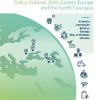Press Releases
Displaying Results 376 - 400 of 1432
Wood energy has been the leading source of renewable energy in the UNECE region for more than a decade, accounting for 35.4% of renewable energy supply for 31 countries, according to the latest results from the UNECE/FAO Joint Wood Energy Enquiry (JWEE). For Austria, Cyprus, Finland, France,
Major disruptions in trade flows from the COVID-19 pandemic have come at huge economic and social cost. Building on lessons learned from the crisis, international experts from the United Nations Centre for Trade Facilitation and Electronic Business (UN/CEFACT) have set out guidelines to help reduce
Over the past 20 years, international and national vehicle regulations have introduced increasingly stringent ceilings on particulate emissions (PM 2.5 and 10) from vehicles’ exhaust.
As a result, according to the emission inventories submitted by countries to UNECE’s Convention on Long-range
New statistical guidance launched today by UNECE will strengthen countries’ ability to measure poverty through improved data disaggregation – a critical step to meeting the first of the Sustainable Development Goals, SDG 1, “end poverty in all its forms everywhere”.
Poverty is complex. It is not
According to national statistics, road traffic deaths in Ethiopia more than doubled between 2007 and 2018, rising from 2,161 to 4,597. Ethiopia loses 13 people per day, or one person every two hours, to road traffic crashes. Given the magnitude of the road safety challenge, which constitutes a
As countries all over the world aim at ‘building back better’ from the COVID-19 pandemic , the recently-launched UNECE People-first PPP Evaluation Methodology for the Sustainable Development Goals can support their efforts by providing a set of benchmarks and indicators to score infrastructure
Nitrogen (N) is essential for life. It is an element of chlorophyll in plants and of protein (amino acids) in animals and humans. As such, it is a major nutrient to allow food, fibre and biofuel production.
However, human activities over the last century (use of synthetic inorganic N fertilizers
Economic and social development in Albania crucially depends on the availability and good quality of water, land, forest and environmental resources, which are, however, under increasing pressure, including from climate change. An online consultation on the Water-Energy-Food-Ecosystems Nexus in
Micro-, small-, and medium-sized enterprises (MSMEs), and women-led MSMEs in particular, have been especially vulnerable to the impacts of the COVID-19 crisis. However, the crisis has also caused a dramatic shift in the business-as-usual approach and paved the way for innovations, green growth, and
Armenia has used non-tariff measures (NTMs) to contain the impact of the COVID-19 pandemic on businesses and other supply chain actors. However, the Government’s ability to unleash the full efficiency potential of support measures and NTMs was undermined by capacity shortfalls in the areas of trade
Like other countries of Eastern Europe and the South Caucasus (EESC), Belarus has undergone a transition from a centrally planned to a market economy over the past three decades. This transition has stagnated, as current growth drivers wane. Systematic institutional constraints and low levels of
Georgia went through a difficult first decade of transition after independence in 1991, facing one of the deepest economic slumps in recent history. 2003, however, marked a turning point, triggering reforms that turned Georgia into one of the most open, well-governed transition economies in the
The new repository will help address disaster risks in line with the 2030 Agenda for Sustainable Development
It consolidates good practices and lessons learned over the past decade in Europe and beyond in the fields of land-use planning and industrial safety
Disasters caused by natural hazards,
The Republic of Moldova, like the other five countries in Eastern Europe and the South Caucasus (EESC) - Armenia, Azerbaijan, Belarus, Georgia, and Ukraine - has grown rapidly following a rocky and difficult transition from a centrally planned to a market economy over the past decades. This
Strategic environmental assessment and environmental impact assessment in a transboundary context have an important role to play in helping countries to achieve a sustainable and green post-COVID-19 economic recovery. This was one of the important messages at the Meetings of the Parties (MoP) to
Ukraine, like the other five countries in Eastern Europe and the South Caucasus (EESC) - Armenia, Azerbaijan, Belarus, Georgia, the Republic of Moldova - has grown rapidly following a rocky and difficult transition from a centrally planned to a market economy over the past decades. This momentum,
Understanding when, where and why perfectly edible food drops out of our food supply chains even in the most food insecure countries is one of the challenges of our times. With one third of food produced for human consumption lost and wasted every year globally and over 820 million people going
The eleventh meeting of the Conference of the Parties to UNECE’s Convention on the Transboundary Effects of Industrial Accidents (Industrial Accidents Convention), drawing to a close today, took place from 7-9 December 2020 – for the first time, in a hybrid form, in view of the COVID-19 pandemic.
Covering an area of approximately 1 million km2, the North Western Sahara Aquifer System (NWSAS) basin is an essential water resource for 4.6 million people in Algeria, Tunisia and Libya (2.04 million in Algeria, 1.48 million in Libya, 0.7 million in Tunisia).
With an estimated groundwater
For many countries, mining is an important industry in terms of economic and social development. Mining activities however generate hazardous waste that is commonly stored in ponds or tailings, often referred to as tailings management facilities (TMFs). Failures at TMFs have regularly led to
The six economies in Eastern Europe and the South Caucasus (EESC) - Armenia, Azerbaijan, Belarus, Georgia, the Republic of Moldova, Ukraine - have grown rapidly following a rocky and difficult transition from centrally planned to market economies over the past decades. Countries such as Georgia
On 23 November 2020, Italy became the thirty-eighth Party to the UNECE Protocol on Pollutant Release and Transfer Registers (PRTRs) to the Convention on Access to Information, Public Participation in Decision-making and Access to Justice in Environmental Matters (Aarhus Convention).
The objective
Countries participating in the United Nations Special Programme for Economies of Central Asia (SPECA) have recognized the need for a more integrated approach towards structural economic transformation in order to build back better while staying on track to achieve the Sustainable Development Goals
UNECE’s Committee on Environmental Policy adopted the Recommendations of the Third Environmental Performance Review (EPR) of Romania on 10 November 2020. The Third EPR of Romania assessed progress made in the environmental performance of the country since 2012 and made recommendations to
Car sharing and carpooling are two of the most visible and rapidly evolving areas in the shift towards sustainable mobility and could support Central Asian countries’ sustainable post-pandemic recovery, according to a new UNECE study. Shared mobility initiatives can contribute to more efficient




















